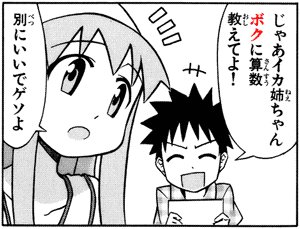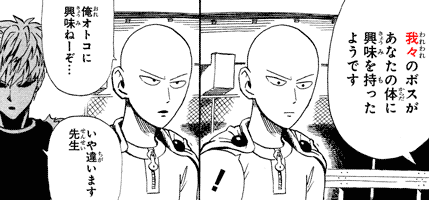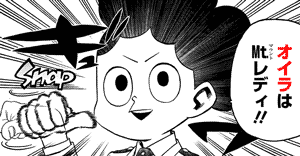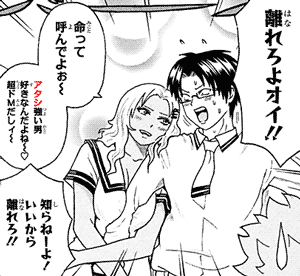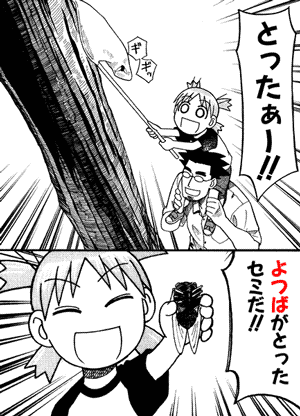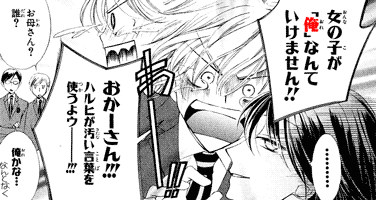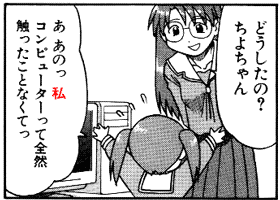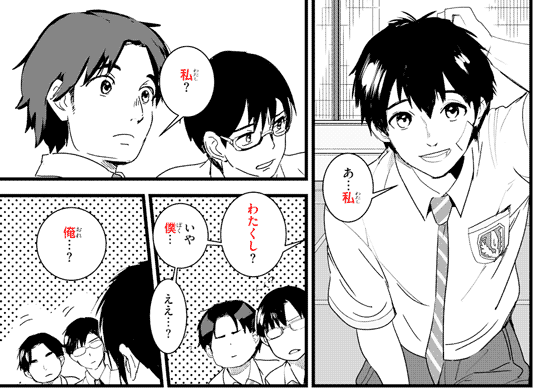In Japanese, boku 僕 means multiple things. Normally, boku means "I" or "me," as a first person pronoun used mostly by boys. It can also mean "boy," as a way to call out a young boy. Originally, it referred to male servants. It's also spelled boku ボク and boku ぼく.
waga 我が
In Japanese, waga 我が means "my," it's a possessive singular first person pronoun, that's rather archaic, but still has certain usage in modern Japanese. Sometimes, it means "one's own" instead.
It's also spelled 我ヶ, 吾が, 吾ヶ, 我, or 吾.
wareware 我々
In Japanese, wareware 我々 means "we," or "us." It's a plural reduplication of the first person pronoun ware 我. The word wareware tends to be used to refer to us as individuals members of a group, or of an organization.
- Context: a wild ufo appears.
- wareware wa uchuujin desu
我々は宇宙人です
We are aliens.
- Context: a caped baldy with extreme strength is targeted by an evil organization. He interrogates one the bad guys concerning why they're after him.
- {wareware no bosu ga
anata no karada ni
kyoumi wo motta}
you desu
我々のボスがあなたの体に興味を持ったようです
It seems {our boss had interest in your body}.- wareware no
我々の
Our. In this case, the speaker is one of many members of an organization, and he's referring these members' boss.
- wareware no
- !
- ore, otoko ni kyoumi nee zo...
俺オトコに興味ねーぞ・・・
I don't have interest in men... - iya, chigaimasu, sensei
いや違います先生
No, [you got it wrong], master.- They aren't "interested" as in "attracted," they are "interested" in why he's so physically powerful.
ware 我
In Japanese, ware 我 means "I," or "me." It's a literary first person pronoun that particularly emphasizes one's very existence,. It's not used normally, except in some set phrases, and by some anachronistic or deity-like anime characters.
It's also spelled ware 吾.
washi わし, 儂 - Meaning in Japanese
In Japanese, washi わし is a first person pronoun typically associated with old men, elders, like a white-haired king of a medieval fantasy country, or an equally ancient sorcerer.
It's also spelled washi ワシ, washi 儂, or washi 私, the latter homonymously with watashi 私. Not to be confused with washi 鷲, which means "eagle," the animal.
Manga: Shijou Saikyou no Deshi Ken'ichi 史上最強の弟子ケンイチ (Chapter 25)
Manga: Galaxy Angel (Chapter 3)
Manga: Seto no Hanayome 瀬戸の花嫁 (Chapter 1)
Manga: Doll-Kara, どるから (Chapter 1)
oira
In Japanese, oira おいら is a first person pronoun used mostly by men, and, in some cases, a second person pronoun, too, as the plural of onore 己.
It's also spelled oira オイラ, or oira 己等.
atashi あたし
In Japanese, atashi あたし is a first person pronoun used mostly by women.
It's also spelled atashi アタシ, or atashi 私.
watakushi ワタクシ
In Japanese, watakushi ワタクシ is a very formal first person pronoun.
It's also spelled わたくし, and spelled with kanji as 私, but this spelling is sometimes avoided due to a more common word being spelled with the same kanji: watashi 私.
Own Name as First Person Pronoun
In Japanese, using your own name as first person pronoun is something that very young children do, and that some people in real life, and some anime characters, do in order to appears more childish, sillier, and cuter. Specially girls.
ore
In Japanese, ore 俺 means "I" or "me." It's a masculine first person pronoun, used mostly by men, and the pronoun that most men use. It's considered rude and arrogant in respectful contexts, and typically avoided with honorific speech. It's also spelled ore オレ, ore おれ.
watashi
In Japanese, watashi 私 means "I" or "me." It's one of the various Japanese first person pronouns. It's considered polite and feminine in casual contexts, but neutral in formal contexts.
First Person Pronouns
In Japanese, watashi 私, ore 俺, boku 僕, and various other words, all mean "I" or "me," that is, they're Japanese "first person pronouns," ichininshou daimeishi 一人称代名詞.
But why are there so many ways to say "I" and "me" in Japanese? What's the difference between them?
The basic gist is that some pronouns, like watashi, are used by women, while other pronouns, like ore and boku, are used by men, except that in business and formal contexts everybody uses watashi, except some men use boku or watakushi ワタクシ instead. It's complicated.
If you're learning Japanese and are unsure of what pronoun to use, just use watashi until you become sure.
